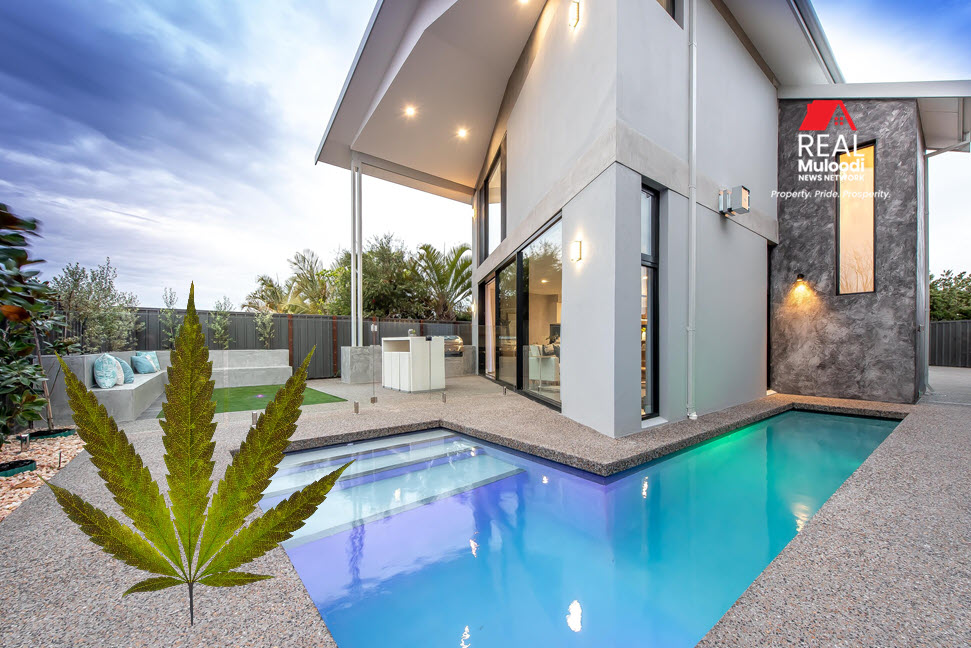UGANDA, Kampala | Real Muloodi News | Hemp belongs to the family of cannabis (marijuana family), although hemp-derived products doesn’t contain enough of the psychoactive agent called THC that creates the “high” which is traditionally associated with marijuana.
Hemp has many versatile uses, and in fact hemp is one of the most versatile materials for construction.
Hempcrete is a bio-composite formed out of the inner woody core of the hemp plant mixed with lime and a small amount of water. The lime component speeds up the setting process by removing excess moisture from the blend-forming hempcrete blocks.
The lime, which acts as a binder, coats hemp particles and, once it reacts with the water, the lime glues hemp particles together, providing excellent material strength.

Hemp blocks can build and renovate buildings, houses and apartments. Hempcrete blocks are also used in making insulating walls, linings, screeds, attic spaces, roofs and renders. It can be poured directly into the building frames, where once pressed, it solidifies.
Advantages of Building with Hempcrete Blocks
Naturally Sourced Material
Building with hempcrete is a sustainable method, from the raw material to its lifespan. Hempcrete blocks have unique natural properties that conventional building materials cannot match.

Hemp requires little care to grow. You don’t need chemicals or fertilizers to grow hemp. It also requires little water.
Hemp contributes to agricultural soil regeneration and is beneficial to the environment if cultivated naturally. As a result, hempcrete does not require a large amount of energy during production, which makes the material environment-friendly.
Low Maintenance
Hempcrete is a low maintenance material. Once used, the insulation lasts for a long time and protects the building from dangerous elements effectively.
Structural Strength
Compared to conventional insulating substances, hempcrete is a dense material. Therefore, it helps reinforce the structural capacity of the building framework.
Furthermore, hempcrete provides an excellent surface for plaster finishes of the building.

Highly Carbon Absorbent
Hempcrete is a carbon absorbent plant, and it has almost 100 kilograms of carbon for every cubic meter of the material.
This is huge compared to traditional construction materials, which contribute towards carbon emission during their manufacturing processes.
Excellent at Handling Moisture
The porous nature of hempcrete allows it to store a lot of moisture, which causes no damage to the integrity of the building. The plant fibres have a large internal surface area, which makes enough storage for a significant amount of moisture.
Resistant to Common Hazards
Hempcrete is highly resistant to mildew, fire, and parasite resistance, making it a long-lasting building material. Since lime binder is used in the production, hempcrete is resistant to fungus and has antimicrobial properties. This means the material can resist the formation of mould, even in highly humid conditions.
Insulation Properties
Hempcrete works great as insulation in hot and cold climates since it is moisture absorbent, antifungal, and antimicrobial. Its high resilience to moisture makes the hempcrete suitable for highly humid environments.
Lightweight
Hempcrete is very light; therefore, it is easy to transport and is ideal for towering constructions, roofs, and lofts.

The Disadvantages of Building with Hempcrete
Hempcrete cannot be used as a foundation structure. It is not a load-bearing material because of its low compressive strength. When building walls, you cast hempcrete around a primary or secondary structural frame made of metal, timber, or concrete.

Although research around the use of hempcrete as a building material is still in infancy, preliminary findings are incredibly positive.
In Europe, for instance, there are ten stories of buildings built using hempcrete blocks.

Some believe that the pyramids, and wonders of the ancient world, were built using hempcrete blocks.









READ MORE LIKE THIS:
VIDEO: Earthbag Construction Technology; 30% Cheaper than Blocks or Bricks



